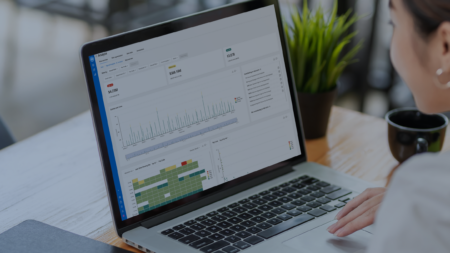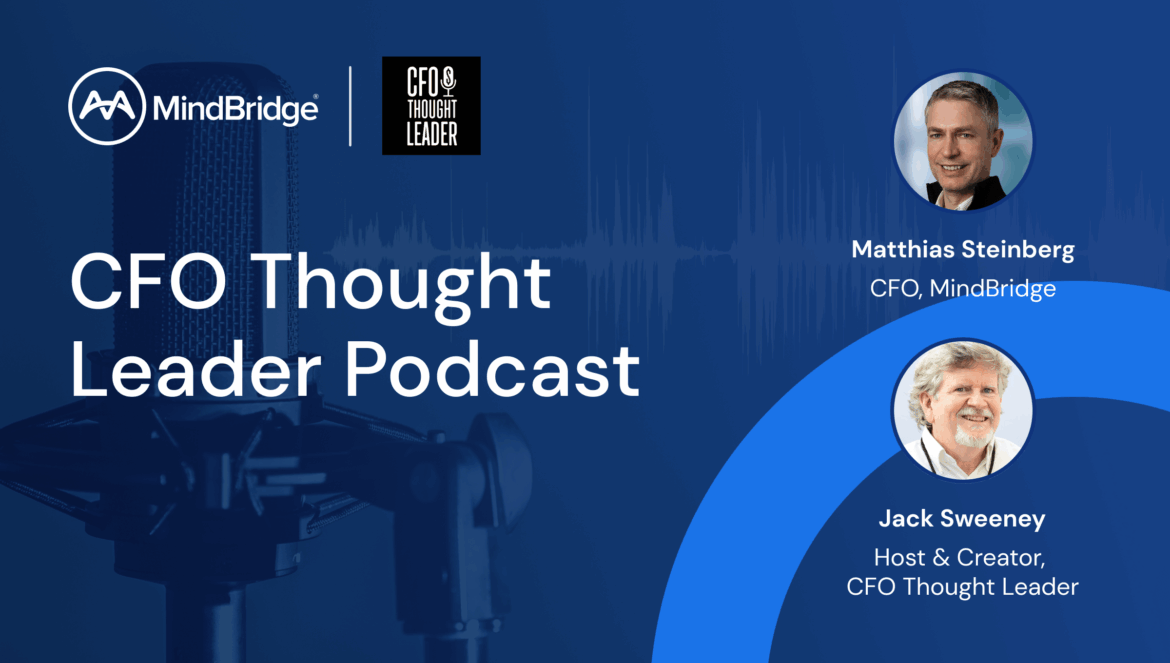The Gap Between Automation and Intelligence
Modern CFOs are being asked to do more than ever—manage compliance, drive strategy, and oversee digital transformation. Yet most finance tech still lags behind, surfacing anomalies too late or burying insights in dashboards that don’t drive action. That’s why AI for CFOs is quickly becoming the modern standard for closing this gap.
In a recent episode of CFO Thought Leader, MindBridge CFO Matthias Steinberg shared how forward-looking finance leaders are closing that gap—not with buzzwords, but with systems that deliver real financial decision intelligence.
🎧 Don’t have time to listen? We’ve pulled out the most significant insights below—and why this episode might change how you think about audit, AI, and the future of finance.
👉 Hear the full episode
1. Continuous Audit Is the Foundation for Continuous Improvement
“You can’t improve what you can’t see—and you can’t see without frequency.”
Traditional audits are episodic and backward-looking. That’s not good enough anymore. Matthias explains why continuous audit matters—not just to catch issues faster, but to better allocate resources, reduce fire drills, and embed trust in what your team isn’t missing.
Whether it’s vendor overcharges, buried losses, or unusual entries, the key is having visibility before the consequences escalate. And once you have it, you can start improving—not just reacting.
2. AI at Scale Starts with Focused Use Cases
“You don’t scale AI by throwing it everywhere—you scale it by proving it somewhere that matters.”
That next layer of improvement doesn’t start with dashboards—it starts with discipline. Matthias shares how MindBridge scaled AI by targeting sharp, outcome-based use cases first: anomaly scoring, predictive oversight, vendor analysis.
AI wasn’t introduced as a silver bullet. It was deployed as a set of trusted tools, each one earning its place through impact—enabled by secure integrations that fit within existing systems and workflows. The results? 20–30% productivity gains and clear ROI across the finance function.
📈 The lesson is clear: start focused, solve real problems, and let value pave the way for scale.
3. The Evolving Role of the CFO: From Controller to Strategy Co-Pilot
“The CFO isn’t just the financial gatekeeper anymore. They’re the co-pilot of business strategy.”
Scaling AI and continuous audit only matter if the team using them is ready. IPO preparation pushed Matthias and his team to shift their mindset—from compliance stewards to strategic operators. That shift required more than tools—it required cultural transformation.
He shares how finance leaders can evolve their teams from compliance enforcers to strategic partners—navigating growth, guiding decisions, and thinking forward. The goal isn’t more data. It’s better direction.
Leading that shift means setting new norms, supporting high-performance teams, and balancing oversight with agility—especially under pressure.
4. Don’t Buy AI—Build Intelligence
There’s a big difference between vendors selling “AI-powered” tools and platforms truly built on AI from the ground up. Some tools sprinkle in AI for marketing. Others are built on it by design. The difference? Accuracy, transparency, and trust.
Matthias outlines what finance leaders should look for—from third-party assurance to model explainability and responsible governance. If you’re going to entrust AI with financial oversight, it can’t be a black box.
💡 The right systems don’t just automate—they enable intelligence at enterprise scale, providing the continuous financial risk monitoring, compliance assurance, and defensible insights that leading organizations trust.
Why It Matters Now
Markets are volatile. Regulators are circling. Budgets are tightening. Visibility, accuracy, and foresight have never been more critical.
Leaders like Matthias are showing what comes next: a central insights factory where audit, finance, and strategy operate in sync—not in silos.
It’s not just smarter AI. It’s better decisions, powered by design and the MindBridge AI™ platform.
🎧 Want the Full Story? Listen Here
This blog only scratches the surface. Tune in to the full conversation for more on:
- AI adoption and team culture
- Structuring finance teams around insight
- The exact use cases that proved AI value internally
- How IPO prep exposed the gaps in traditional finance culture
- Where finance is headed next
👉 Listen to the complete podcast here
Frequently Asked Questions
Q: What is AI in finance?
A: AI in finance uses advanced algorithms and machine learning to analyze huge volumes of data, automate tasks like anomaly detection, and help CFOs make faster, more informed decisions.
Q: How is AI used in finance today?
A: Common uses include fraud detection, real-time risk monitoring, predictive forecasting, intelligent automation of audits, and personalized financial recommendations.
Q: What are the benefits of AI in finance?
A: AI increases accuracy, improves speed, reduces manual effort, strengthens compliance, and unlocks deeper insights that drive strategic decisions and better financial outcomes.
Q: How can CFOs start using AI in finance?
A: Start with focused, high-value use cases like continuous auditing and anomaly detection. Partner with a proven AI platform—like MindBridge—to ensure explainability, scalability, and quick ROI.



